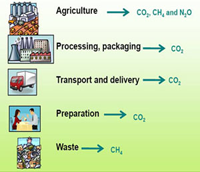Getting Ready for Charting Emissions from Food Services (CHEFS)
by Jennifer Andrews, Director of Program Planning and Coordination, Clean Air-Cool Planet®
(This article appears in the April, 2010 issue of The ACUPCC Implementer)
You want to reduce the carbon footprint of campus dining—but first you need to have a better understanding of what that impact is, and what is driving it. What’s worse: the ever-present macaroni and cheese, or the even-more-ubiquitous pizza? Users of Clean Air-Cool Planet’s Campus Carbon Calculator™ have always known that “you have to measure to manage;” and since it’s potentially expensive, inconvenient, controversial, or even downright impractical to adopt every “green” option you can think of for food purchase, food service and waste management, it’s important to have solid information at hand to help your campus prioritize and make best use of its resources.
To meet this need, CA-CP is getting ready to release its highly-anticipated new CHEFS tool. The Charting Emissions from Food Services (CHEFS) calculator is different from the Campus Carbon Calculator™ in that it adopts a life-cycle rather than a strictly entity- level carbon accounting approach—but it is similar in that it aims to provide a standardized, quantitative tool for decision-makers working to find the most effective ways to lower campus carbon emissions.
In addition to comparing the relative impacts of recipes or shopping lists, CHEFS will help you understand how the GHG impact of your food purchasing compares to other aspects of your GHG inventory. And if you want to be able to communicate additional quantitative information in your educational campaigns about food choices, trayless dining, or the sustainability efforts of your dining service management, CHEFS will enable you to do just that.
CHEFS will be an ongoing endeavor, part of which will be aimed at compiling more and better life cycle data to enable actionable analyses. In the course of developing CHEFS, CA-CP has really seen the lack of North-American, product-specific, peer-reviewed, transparent life-cycle data—which means that there are excellent research opportunities available to faculty and students interested in contributing to this field. For example, during the pilot phase of CHEFS last fall, students, faculty and staff from Elon University took an in-depth look at a handful of produce items used heavily in Elon’s dining halls.
This allowed students to better understand the constraints of the marketplace in which Elon is participating, campus staff an opportunity to hear students’ concerns directly, and CA-CP useful information to incorporate into the CHEFS tool. It also provided students an important educational opportunity to learn about life-cycle analysis and to practice their researching skills.
CHEFS will be a web-based tool. Like the Campus Carbon Calculator™, its basic functionality will be freely available, and its references and supporting data will be as transparently noted as possible. The bad news: It will require data collection and input regarding campus purchasing and operations by users. Just like your greenhouse gas inventory, your CHEFS analysis results will only be as good as the supply data you are able to collect; and just like your GHG inventory, the process of collecting your CHEFS data is likely to be educational, surprising, occasionally labor-intensive and confusing—and capable of engaging new champions and allies in your campus sustainability work.
Many of the schools participating in the CHEFS data collection pilot last summer found that the process of investigation uncovered new opportunities to ask questions, track information that had been hitherto neglected, and better understand their campus supply chains, purchasing policies and limitations. We look forward to very shortly being able to provide these pilot participants with some numerical results based on the data they collected.
To prepare our campus partners for the launch of CHEFS, CA-CP is making available a free data collection template that can be downloaded at http://cleanair-coolplanet.org/chefs/. Most basically, the template will ask the user to gather the types and quantities of items purchased, with the option to also track important supply chain details as well as operational data about campus dining services. By downloading the form and beginning your data collection process now, you will be ready to use and benefit from the CHEFS tool upon its release.

